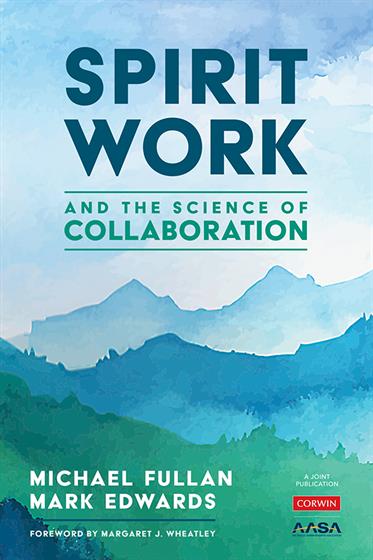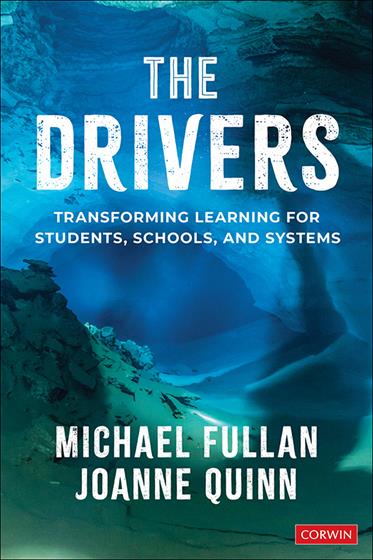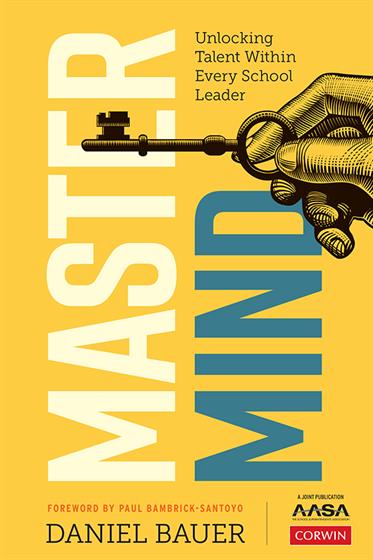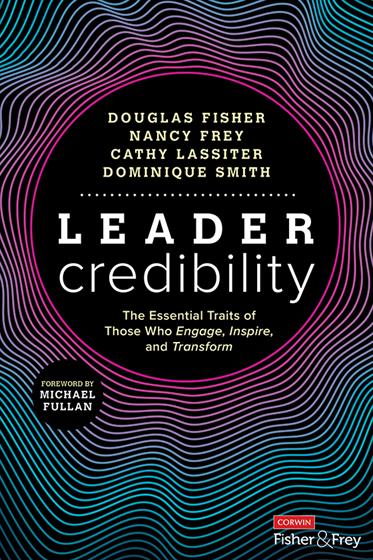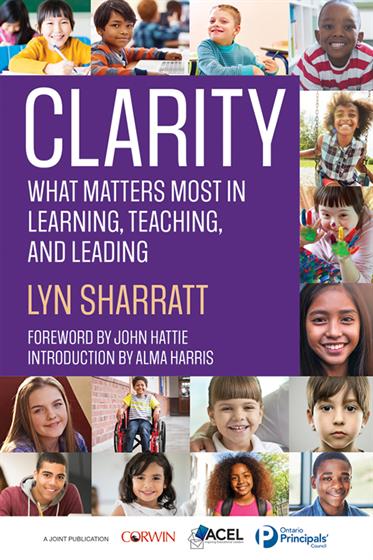Series 4 Leaders Coaching Leaders Podcast
[00:00:00.00] [MUSIC PLAYING]
[00:00:00.84] NARRATOR: Welcome to Corwin's Leaders Coaching Leaders podcast
with host Peter Dewitt. This podcast is from education leaders for education
leaders. Every week, Peter and our guests get together to share ideas, put
research into practice, and ensure every student is learning not by chance, but
by design.
[00:00:19.64] PETER DEWITT: Hey, Tanya. How are you?
[00:00:21.35] TANYA GHANS: Hey, Peter. I believe that we're talking from an
even further distance than we usually do. You're out in the field, doing the
good work. Is that correct?
[00:00:32.21] PETER DEWITT: It is. So for those of you that watch on
YouTube, you're going to notice my space is a little bit different. I try to
record these from home, from my home office, but I am in my hotel room in
Seattle. I'm here for a couple of days doing some leadership work, so yeah,
yeah.
[00:00:47.33] TANYA GHANS: That's great.
[00:00:48.23] PETER DEWITT: But it's always good to-- I was looking forward
to this conversation. So I know that people might think-- and I think people
have a variety of feelings because we're interviewing Mike Soules, the
president of Corwin, which is part of Sage. And when you and I talked, we were
both purposeful in why we wanted to do this. It was not because it was going to
be a commercial for Corwin.
[00:01:10.79] Quite honestly, I've known Mike for 11 years, and when I think
of leaders, he is definitely somebody that I see as a leader that I look up to.
He has been-- and I talked to him a little bit about my personal examples when
we're doing the podcasts, but even during this time, when you're hearing about
book banning. And the reason why we contacted him in the first place, too, is
because we know that there are certain publishers that are kind of backing off
on talking about equity, diversity, and inclusion.
[00:01:40.58] And Mike wanted to double down where that was concerned
because he sees it as a long-term piece that we need to be able to focus on. So
this conversation is really about all of that plus a little bit of John Hattie
news because John's a huge part of the Corwin family. So I really hope people
will listen to this and not just listen to it as, well, he's not a school
principal, or he's not a school superintendent, or he's not a teacher. The
reality is, I think he has a lot of very good insight for us as far as what it
means to be a leader during very difficult times.
[00:02:17.90] TANYA GHANS: Yeah, I think the things that he talks about are
certainly transferable. I mean, there are always a set of leadership skills
that are transferable to all leaders, but Mike is still closer to leaders in
schools because of the content of his work.
[00:02:32.87] So I certainly found the talk highly relevant, and in
listening to him, it reminded me-- I believe Maya Angelou had said that, of all
the important traits or characteristics, that courage is the first and most
important one because it's the one that's needed almost always before you take
the next step, or you do something else. It's a precursor trait, if you will.
[00:02:55.68] So I think not only does Mike embody that, but he also is
going to give listeners some real guideposts to kind of drive their decision
making, and how to just-- not just survive, but thrive during this 2022, and
gives a real hope for 2023. So I think listeners are going to really enjoy it.
[00:03:15.23] PETER DEWITT: Yes. So happy listening, as we say.
[00:03:18.98] TANYA GHANS: Happy listening.
[00:03:20.39] [MUSIC PLAYING]
[00:03:23.86] PETER DEWITT: Mike Soules, welcome to the Leaders Coaching
Leaders podcast.
[00:03:28.34] MIKE SOULES: Thanks, Peter. It's great to be here.
[00:03:30.90] PETER DEWITT: I have to admit, this is a different interview
for me because you, of course, are the president of Corwin, and I just feel
like, over the past year or so, you and I have talked in a variety of spaces
and talked about a lot of things like leadership and even the complications
with publishing. And we know that there are things like book banning, and I
just really appreciate that you were able and agreed to coming on to the
podcast so we could talk a little bit about it.
[00:04:06.27] What Tanya and I usually like to do is start off every podcast
with developing sort of a common language and a common understanding, and one
of the things that I wanted to ask you about is leadership. When you think
about leadership-- because you are very much a leader. When you think about
leadership, what's the common understanding you would want people to have
around that term?
[00:04:30.37] MIKE SOULES: Gosh, could you start with a simpler question?
First off, Peter, thank you very much for inviting me, and kind of shocked that
you were actually able to book me. Nobody does, so it's rare. But I'm kidding,
of course.
[00:04:48.96] Leadership is actually very difficult in the sense that if you
take it seriously, you really are thinking about everyone in the organization
and wanting to provide context in terms of where it is as an organization that
you're trying to do. And so for me, it's about setting a vision for where we're
trying to go as an organization, not just in the next couple of months, but in
the next couple of years. And then providing context so that everyone
understands what role they play in that. And inviting them to challenge that
vision as well.
[00:05:30.51] Because at the end of the day, companies are made up of
people, and people who are trying to strive to do the absolute best. And so,
for me, I always keep in mind that everyone shows up, whether it's in the old
days when we came into offices, or these days when we show up in these boxes on
video, wanting to do the absolute best.
[00:05:54.06] And so how do we equip them to do the absolute best and
provide them with a vision and a guidepost for where we go? I'm not sure if
that answered your question.
[00:06:03.81] PETER DEWITT: It does actually. And I feel like when you talk,
there are so many things that I want to talk to you about. Number 1 is, how did
COVID impact that? Because publishing we know, I mean, everybody had a hard stop
and then try to figure out where to go next. How did COVID impact you as a
leader with what you were trying to do?
[00:06:27.42] MIKE SOULES: I think I'm certain much like any movie that we
see that begins with December 5th in the 1940s. You know that something's going
to happen, or 9/10 before 9/11. Right? The same thing March 2020, all of us are
going to start these stories which is we were having a leadership conference
and talking about what we were going to do for 2020 and 2021.
[00:06:59.13] And this COVID thing was happening. And like everyone said, be
over in about three weeks. It wasn't.
[00:07:06.45] And so what ended up happening and I think what has been very
helpful is we had to make really hard decisions very quickly. We had an
existential threat, meaning no one was going to buy books and no one was
booking face-to-face training in terms of professional development because they
were dealing with far more important issues, which was making sure that they
could figure out how to open schools safely and how to take care of kids, and
bring the adults back into the system.
[00:07:41.56] So everything stopped for us. And so we had to stop ourselves
and say, what do we want to do as a company? And there was no niceties about
it.
[00:07:51.81] I think what it forced us to do was to confront any third rail
issue that may have been in an organization in the past and really say let's be
honest. What has the most impact? What are we going to do that is going to help
keep us alive as a company, but also is going to be most meaningful in terms of
the customers that we serve?
[00:08:14.53] And so it really focused us in a way that we could never have
done in the past. And I keep challenging our group to continue to have 2020
thinking as opposed to 2019 thinking as we move into what we're doing for '23
and '24 and '25 and beyond.
[00:08:36.96] PETER DEWITT: Would you say-- no, I'm going to ask it another
way. How has the past two years made you a better leader?
[00:08:46.79] MIKE SOULES: Oh, I think it's made me more honest. And I say
that in the sense of not that I wasn't honest in the past. I'm a consensus
builder.
[00:09:00.40] So I tend to take more time in terms of building a coalition
around ideas and thinking and things. We didn't have that luxury. And so when I
know what it is that I think we should be doing, I feel much more empowered to
just say, no, this is what we're going to do, and let's move forward.
[00:09:21.46] Again, taking into consideration, of course, everybody's ideas.
But I've been at this for a very, very long time. And I know where we're going
and what we need to do.
[00:09:31.88] And so I think that's the piece. I guess it's shortcutted the
my decision making in a way that's been very, very positive I think for the
organization. |
[00:09:44.32] PETER DEWITT: So we saw each other in July for the Visible
Learning Conference. And one thing I've always appreciated about you and it's
one of the reasons why I always publish with Corbyn. This is not going to be
some commercial for Corbyn. But one of the reasons why I've always published
with you is you've had a pretty deep stance when it comes to things like
equity.
[00:10:03.36] I mean, I've said this to you many times before. But when I
was a brand new author and just did my dissertation on safeguarding LGBT
students. And Arnis Burvikovs, our former editor said, "I want you to
publish a book on that."
[00:10:20.20] And I remember just after the book published, you stood up at
a corporate event and started talking about it. And it was amazing to me.
Because even though back then 11 years ago, people would have looked at
safeguarding LGBTQ students as like not a big topic, like this is just
something we should be doing.
[00:10:39.67] I remember it just being awe inspiring that you would do
something like that. And over the years, I've seen you do that so many times.
And when we were together in July, you got up on stage and you were talking
about equity.
[00:10:54.42] How do you navigate your way through this very political world
that we seem to be in when it comes to publishing books on equity? Because
that's something that you've always been behind. And I see that there are other
publishers, you hear stories about other publishers that are trying to back off
on publishing work around equity.
[00:11:17.46] And you're moving forward with it, which I think is one I want
to thank you for it because I think it's important. But how do you navigate
this political space when there are words like equity that seem to be outlawed
in states?
[00:11:36.26] MIKE SOULES: We're in a place in time where people have to
make choices around things. And once, again, stand up for what it is that we or
they believe in. One of the wonderful things about SAGE Publishing who is the
parent company of Corwin is Sarah Miller McKeown has always believed in social
justice and the work that's there in terms of all the justices.
[00:12:11.39] And I have fundamentally believed in the 13 years that I've
been with Corwin. That we continue the legacy of the work that we've done over
30 plus years of publishing the best voices in whatever area that there is. But
one of the most important areas is in equity and the work that we do there.
[00:12:32.78] It is under attack in a number of places. But we will not step
back. We will double down. We will triple down in terms of the work that we're
doing.
[00:12:43.85] Because we know that we're on the right side of history in
terms of what it is that we're doing. No one has ever celebrated backsliding in
terms of what it is that our people's rights, their dignity, and being able to
appear in their workplace or in their classroom in the fullness of who they
are.
[00:13:04.61] So if we can do any little bit that helps move that forward in
terms of giving people the evidence base that they need, in terms of giving
them the words that they need, in terms of giving them a framework that they
need to think about disproportionality, to think about what it is that we're
trying to accomplish, because schools are the cornerstone of a just and
thriving society.
[00:13:29.65] Where else, but here. Where else, but with teachers and
educators in terms of the work that we do. So we are passionately dedicated to
this work. And we take it very, very seriously.
[00:13:42.86] Some of our books have already been on banned lists. And as
far as I'm concerned, that'll be short-term. And we will keep striving in terms
of the work that we do.
[00:13:54.13] The work that you did 11 years ago was incredibly important.
It began to give educators an understanding of children that they had been
dealing with, but didn't know how to deal with in the past. And so will
continue to be on the Vanguard of the work that we're doing.
[00:14:11.50] And I'm incredibly proud of our authors, of the work that we
do, and of our dedication to this particular area.
[00:14:20.66] PETER DEWITT: Thank you. So I want to switch gears a little
bit because you are the president of publishing. And so you make all the big
decisions. And everybody who's listening who would like to publish books--
[00:14:33.80] Tanya, Morgan Fox, and I actually did a podcast interview
about what it's like to try to write for the leadership line and what we look
for. So I want to switch gears a little bit.
[00:14:44.84] And what do you look for in books? Like when Corbin's going to
be publishing something, what are you looking for? Is there any I don't want to
say recipe? But how do you know when you look and say, wow, that is a book we
need to be able to publish.
[00:15:03.97] MIKE SOULES: Yeah. When I first got hired, I made the joke, do
I have to actually read in this job? And the answer is--
[00:15:11.59] PETER DEWITT: [INAUDIBLE] sense of humor that I love.
[00:15:13.78] MIKE SOULES: The answer was, yeah, you have to read. What do
we look for? Here's the thing.
[00:15:20.47] For anyone out there that's thinking about this, look very
carefully at that table of contents to begin. What do each one of those
chapters do and how do they build one upon the other in terms of the story that
you're trying to tell and the message that you're trying to get out?
[00:15:41.87] And then I think the other part is being really brutally
honest with yourself around who the audience is that you are wanting to serve.
Everybody wants to say, oh, it's for everyone. In most cases, it's not for
everyone.
[00:15:58.89] It's for a very specific audience. And sometimes that's OK.
And so that's what we're looking at in terms of is there a clear voice.
[00:16:09.63] I think that's the hardest thing for authors to develop over
time is what is their voice, right? You've developed a voice. You can read
something. And it's a Peter Dewitt title in terms of what it is that you're
doing.
[00:16:24.87] Same thing with a whole host of folks that I could mention. So
I think it's that. What's your voice, what is it that you're trying to do in
terms of your message, who are you trying to impact, and how are you advancing
whatever the discipline is that you're in?
[00:16:42.29] Because what we don't need is a rehash of history, right? A
little bit of it is good for context setting. But where are we trying to move
the discipline or the area? Those are the things that we look at. And that's
what gets us excited about in terms of titles that we want to publish.
[00:17:01.41] PETER DEWITT: We have a lot of listeners that are leaders,
teachers. And they might be thinking, OK, so Mike is a leader of a publishing
company. What do you want? How do you want to help teachers and leaders? Like
what advice can you offer to them?
[00:17:21.07] We know that-- I've heard about things like quiet quitting, I've
heard about the teacher shortage, we hear about-- we know stress and anxiety is
a really huge deal for educators. What advice can you offer to them? And how
were you trying to help them right now? By the books that Corwin could be
publishing, or the webinars that you're offering, or anything like that.
[00:17:51.80] MIKE SOULES: I think in the 30 plus years that I've been
working in this space, I've never seen an environment like the one that we're
in right now in terms of just people feeling tired. And so I would say to the
leaders that are in organizations, take a deep breath and just love on your
team. Give them the support that they need right now.
[00:18:28.82] And that's what we're hearing from so many people is for this
particular year, we don't want to take on a lot of new initiative, we just need
to take a breath and a pause. And then 2023, we'll be back and will be hitting
at it.
[00:18:42.70] We're going to be onboarding almost a third of a new team in
the US particularly in terms of educators coming into these schools. And so
what we're going to need is really very solid evidence-based training programs
that are going to help support those teachers.
[00:19:03.88] Well, we are known as the premiere publisher in professional
development. Many people don't realize we are a full professional learning
organization. And so we do that training.
[00:19:14.60] And so what we develop along with our colleagues, especially
with John Hattie and the Visible Learning Work is real solid, evidence-based
work, that is the blocking and tackling in terms of what it is that you need to
do in your classroom, that will give you the language that you need for
learning, but also the instructional moves that are going to be necessary in
terms of whatever it is the context is that you're dealing with.
[00:19:40.12] And that's complex, but it is important in terms of what it is
that new teachers and veteran teachers are going to need right now in terms of
where they are and the context of what's happening. They don't need fancy new
initiatives. What they need is really smart tools to understand what it is that
they've got in front of them in terms of their kids and the training that's
going to help them really share a learning language with their students so that
they can measure their impact and understand that if you haven't taught it,
then they haven't learned it.
[00:20:20.50] So how do you own that as a teacher? But also how do you make
sure that every student that you have is owning their own learning and knows
what to do when they don't know what to do? If we can get there in terms of
teachers understanding their impact, and what that means, and can measure it,
and students knowing what to do when they don't know what to do, I think we'll
be in a really, really good place as we move forward.
[00:20:48.38] PETER DEWITT: Yeah. So I have one more question about that.
I'm glad you mentioned John Hattie. John has had an enormous impact on what I
do, my life, everything. What is the partnership with John meant to you?
[00:21:04.35] MIKE SOULES: Oh. Well, that's multidimensional. From a company
perspective, a professional company perspective, the fact that John wanted to
partner with Corwin and bring his life work to us, validated who we are as an
organization in the sense of the seriousness with which he takes professional
learning and the seriousness with which he does his work.
[00:21:35.76] And so the fact that he saw us as an organization that can
help him scale that work globally was a real credit to us. I don't mean that in
a braggy way I mean that in a sense of that was a huge accomplishment for us in
terms of what it is that we believe and how we do our work.
[00:21:56.98] I will say that John has challenged me and my thinking around
professional learning enormously. And I'm still learning every day. I was with
him all last week. And I still go, oh, jeez, I didn't know what I didn't know
in terms of what it is that he challenges us on.
[00:22:20.88] So John means everything to us. He pushes us and our thinking.
Probably a third of what we publish now is based on the Visible Learning Work.
[00:22:33.09] We will be announcing a huge new redesign of our professional
learning with Visible Learning at the middle of it. And I'll announce here.
I'll make a little news for you.
[00:22:43.98] PETER DEWITT: I was going to say, Mike, you can't be on this
podcast and not.
[00:22:47.31] MIKE SOULES: I got some news. I got some news for you. Right
now, I'm going to give you some news. Which is we have just finished a global Delphi
study with John.
[00:22:58.05] PETER DEWITT: OK.
[00:22:59.33] MIKE SOULES: On equities, identity, and belonging. And one of
the criticisms that John has had is you're always just looking at student
achievement. You're not looking at the soft skills, right?
[00:23:11.03] Well, we've now got 10 mind frames on equity, identity, and
belonging, which will be coming out in the next month or so. And not only a
book, but several suites of training around that which are going to be
groundbreaking. And the fact that John is leading that charge along with
Corwin, I'm just incredibly proud.
[00:23:35.51] PETER DEWITT: That's awesome. Well, thank you for at least
giving us that news here, right?
[00:23:40.31] MIKE SOULES: There you go. Just for you my friend.
[00:23:43.79] PETER DEWITT: Well, Mike, one of the things you talk about a
lot is courage. And I have to admit that you've always been a courageous leader
in the 11 or 12 years that I've known you. Because even during the toughest of
times, you know what the important work is and you keep looking forward.
[00:24:00.53] And I know a lot of us deeply appreciate that. So on behalf of
Tanya, my counterpart for the Leaders Coaching Leaders podcast, thank you so
much for taking the time to be on this.
[00:24:11.33] MIKE SOULES: Well, Peter, thank you very much. And thanks for
the invitation. I appreciate it very, very much more than you know. And I am
thrilled that we got a chance to just spend a couple of minutes together and
see your handsome face.
[00:24:27.14] PETER DEWITT: The feeling is mutual.
[00:24:28.28] MIKE SOULES: Thank you. Good.
[00:24:29.18] PETER DEWITT: Thanks.
[00:24:30.38] MIKE SOULES: Thanks. Thanks so much.
[00:24:35.75] TANYA GHANS: Oh, Mike, that was I think as good as we really
thought it was going to be. Mike brought a new lens and angle to this work of
leadership, but remained highly relevant. And I think left leaders with some
real ways that they can maybe go back into their practice with some fresh eyes
and some strength. What it takes to just continue to persevere because I think
we always need a reminder and a dose of that in complicated journeys like
school leadership.
[00:25:09.20] PETER DEWITT: Yeah. And I agree with you. And the thing is
it's funny when I watch body language because when I moderate a chat or
whatever, I'm always looking at the body language. And Mike can be very
humorous.
[00:25:20.60] I mean, we both have been with him at events. And he's got an
incredible sense of humor. But then when I started talking about things like
equity and book bending, you just saw him lean in and he was pretty adamant
about that.
[00:25:36.12] And I think what's important, too, is that we often will look
at COVID and how it impacted us as teachers or as leaders. But make no mistake,
COVID impacted the publishers in a very, very big way. And I wanted to be able
to talk about that.
[00:25:54.83] And also, I think it's important to acknowledge and honor the
relationship that he has with Hattie as well. For many people, not just those
who write for Corwin. John has had an enormous impact on what I do.
[00:26:08.06] So just being able to talk about that is really important,
too. And he was very, very lucky that he actually made that announcement with
us. Because I would have been very annoyed if he said, an announcement's coming
soon, and then he didn't say anything.
[00:26:20.43] TANYA GHANS: And didn't tell us. Yeah. He didn't tease. Yeah.
That's, again, one of my strengths is he really tries to be considerate and
give people enough of what they need and not drive me crazy especially during a
year of the pandemic.
[00:26:35.43] So, yeah, I'm glad he was able to tell us enough about this
new initiative. And it sounds like a really, really exciting one.
[00:26:42.59] PETER DEWITT: Yeah. Well, I do a lot of interviews. But that
one was very important for me just because it really was an amazing experience
not to get too personal. But when you do your dissertation in safeguarding
LGBTQ students, and then your editor says that's going to be your first book.
The only feelings that go along.
[00:27:10.07] TANYA GHANS: Yeah.
[00:27:10.52] PETER DEWITT: Because sometimes when you're writing a book on
the topic, is that the only topic that you're going to be able to write about?
And there are so many things that I wanted to be able to focus on.
[00:27:19.35] But I remember being at this Corwin event, and we're talking
Michael Fallen, all these people were there. And Mike got up on stage and said
I want to talk about one book. And he started talking about mine. And nobody
know I was.
[00:27:33.53] TANYA GHANS: Yeah.
[00:27:34.01] PETER DEWITT: And I remember just feeling this overwhelming
sense of gratitude. Because as somebody who nobody knew, still a school
principal, I had been writing for Adweek for maybe like a few months. But for
that to happen, it made me realize what kind of focus that Mike wanted to be
able to have.
[00:27:54.59] Because he was brand new and it only started-- I mean, I think
he had started a year before that or so.
[00:27:58.88] TANYA GHANS: Yeah.
[00:28:00.05] PETER DEWITT: And it showed what kind of focus that he wanted
to have on inclusionary topics. And he hasn't let that go. In fact, I think he
talked about streamlining, but, also, I think it's just an area of passion for
him that he thinks is really important for everybody in order for all of us to
be more human together.
[00:28:19.44] And so I'm glad that we got into that. And for me, it was a
really great conversation to have.
[00:28:24.44] TANYA GHANS: Yeah. Gosh. And listening to you just really
reminds me of the impact it had for you to be seen in that moment with all of
your accomplishments and everything you already had going for you by that time.
Imagine the impact on our students, where sometimes this is the first place
that they get seen is with a teacher or can be.
[00:28:43.13] So heavy and great stuff all around. I feel like I've got some
real food for thought myself.
[00:28:50.51] So, listeners, as always, we really enjoy learning alongside
of you. And we really, really hope you enjoyed this episode as much as we did.
[00:29:00.77] PETER DEWITT: Yes. And thank you to everybody for listening.
And Tanya, until next time.
[00:29:05.58] TANYA GHANS: See you next time. Peter, have a good one.
[00:29:10.05] PETER DEWITT: All right, you, too.
[00:29:10.97] TANYA GHANS: Bye-bye.
[00:29:11.72] PETER DEWITT: Bye.
[00:29:12.50] TANYA GHANS: OK, so that ends it. And how is Seattle going?
[00:29:16.28] PETER DEWITT: I just got here last night at 6 o'clock. And the
guy I work with, this is the long term work. So it's part of my lead advisor
work. So, yeah, went to dinner with one of the guys that I work with Jenny
Donahue is coming in.
[00:29:29.45] TANYA GHANS: OK. I know.
[00:29:30.77] PETER DEWITT: She is delayed. So I think she's coming in
today. She was supposed to come in last night.
[00:29:35.77] TANYA GHANS: Yeah.
[00:29:36.61] PETER DEWITT: But no, I'm here until I leave Friday morning.
[00:29:40.12] TANYA GHANS: OK, just a few days.
[00:29:41.48] PETER DEWITT: Yeah, it's just a few days. But I love coming
here. It's absolutely-- Seattle is just like gorgeous.
[00:29:46.78] TANYA GHANS: Yeah. And you said that the last time. I'm going
to put that on my bucket list. My United States bucket list.
[00:29:53.41] PETER DEWITT: Yeah, it's just such a nice-- there's just such
a cool feeling when you come here. And so yeah.
[00:29:58.33] TANYA GHANS: OK. All right.
[00:29:59.59] PETER DEWITT: All right.
[00:30:00.43] TANYA GHANS: All right, Peter. So until we talk again.
[00:30:02.56] PETER DEWITT: Yes, Tanya. Good to see you.
[00:30:03.88] TANYA GHANS: You, too.
[00:30:04.66] PETER DEWITT: All right.
[00:30:04.93] TANYA GHANS: Bye.
[00:30:05.74] PETER DEWITT: Have a good one. Bye.
[00:30:06.31] [MUSIC PLAYING]




